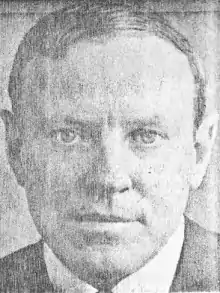Roger East (journalist)
Roger East (7 February 1922 – 8 December 1975) was an Australian journalist who was murdered by the Indonesian military during its invasion of East Timor in 1975.[1][2]
Roger East | |
|---|---|
 Roger East in an undated photograph | |
| Born | 7 February 1922 Sydney, New South Wales, Australia |
| Died | 8 December 1975 (aged 53) |
| Cause of death | Execution by shooting |
| Nationality | Australian |
| Occupation | Journalist |
| Years active | 1940s-1975 |
| Known for | Being murdered during the Indonesian invasion of East Timor |
| Notable work | ABC Television, Visnews, Australian Associated Press, Radio 2 |
East was a freelance journalist who worked for the Australian Associated Press (AAP). He travelled to Portuguese Timor (now known as East Timor) in October 1975, following the story of the Balibo Five, who had been killed by Indonesian soldiers just weeks before. East was captured by the Indonesian armed forces and was brought, along with many other prisoners, to the Dili waterfront where he and scores of others were then executed by firing squad.[1][2]
Previously, he had worked as a publicity officer for the Australian Country Party in Queensland and had been working in Darwin as a press officer for the Darwin Reconstruction Commission (which was created after the devastation of Darwin by Cyclone Tracy in December 1974).
Early life
Born in Girraween, in western Sydney in 1922, East was raised near Dubbo in country New South Wales.[1] He had two older brothers, Bill and Alan, and a younger sister, Glenise. East was a child of the Depression and his teenage years in the 1930s were difficult ones. During World War II, East served in the Royal Australian Navy[3] spending most of his war service as a signalman on HMAS Burnie, a corvette, during the fall of Singapore and subsequent escort duties.
Career
After the war, East entered journalism. Working at first in regional New South Wales newspapers, in the 1950s he left Australia to cover foreign events in places as varied as Cyprus, Africa, China and the Suez Crisis. In the 1960s, he went to work for Visnews (today Reuters Television) and as editor of an English language newspaper in Spain. East was quoted as stating that he experienced more freedom of the press in Spain under Franco than in Australia under Menzies. In the early 1970s he worked as a press officer for different organisations including both the Australian Country Party and the Australian Labor Party.[3]
Investigating the Balibo Five
At the time of East's arrival, East Timor was under the de facto government of Fretilin, a left-wing political party. The Portuguese governor had fled to the island of Atauro and was refusing to return to the capital, Dili. Fretilin issued a Unilateral declaration of independence from Portugal on 28 November 1975.
East was one of only three journalists in Timor — the other two were Michael Richardson, the South-East Asia correspondent for The Age and Jill Jolliffe, a freelancer who was then working for Reuters. When it became obvious that a full-scale invasion by Indonesia was imminent, Richardson and Jolliffe left with the Red Cross and went to Darwin. East, however, decided to remain in East Timor. He planned to retreat with the Fretilin forces to the mountains in the interior and report from there to the outside world through high frequency radio transmissions.[1][2][4] East's last report for the ABC's Correspondents Report was heard on the afternoon of 7 December 1975.[5][6]
He was captured by the Indonesians before he could get away. Eyewitnesses later reported that East was brought, along with many other prisoners, to the Dili waterfront, where he and scores of others were then executed by firing squad.[1][2][4]
Following an inquest into the murder of the Balibo Five, there were calls for a similar inquest into the murder of East.[2]
Media
In Timothy Mo's novel The Redundancy of Courage, the character Bill Mabbely is based upon Roger East.
Anthony LaPaglia starred as East in the 2009 Australian feature film Balibo, which tells the story of the Balibo Five.[7][8] The film was co-written by David Williamson and Robert Connolly and was based upon Cover-Up, a book by Jolliffe, as well as the work of Clinton Fernandes, who served as the film's historical consultant.[9]
See also
References
- Cronau, Peter. "Roger East (1922-1975), journalist". In memorium. Australian Broadcasting Corporation. Retrieved 18 March 2018.
- Barker, Anne (11 June 2007). "Justice demanded for 'sixth Balibo journalist'". ABC News. Australia. Archived from the original on 29 October 2016. Retrieved 18 March 2018.
- Rayner, Michelle (14 December 2008). "Roger East - Australia's Forgotten Journalist" (transcript). Hindsight. ABC Radio National. Retrieved 18 March 2018.
- Plush, Vincent (May 2012). "Democratic Republic of Timor Leste 10th anniversary". Timor: The first decade. Australia: National Film and Sound Archive. Retrieved 18 March 2018.
- "Roger East 1922-1975, journalist". Australian Broadcasting Corporation. Retrieved 16 February 2021.
- "Nine murders, no prosecutions". MEAA. 29 April 2020. Retrieved 16 February 2021.
- Anthony LaPaglia (4 August 2009). "Balibo: Anthony LaPaglia talks to Lindy Burns" (streaming audio). ABC Radio Melbourne (Interview). Interviewed by Lindy Burns. Retrieved 18 March 2018.
- "LaPaglia leads Balibo five thriller cast'". ABC News. Australia. 28 September 2007. Retrieved 18 March 2018.
- Fernandes, Clinton (Prof). "Timor - The Balibo Five". Australian Defence Force Academy. UNSW Australia. Archived from the original on 28 March 2016. Retrieved 18 March 2018.
Further reading
- Dunn, James (1996). Timor: A People Betrayed. ABC Books. p. 254.
External links
- Carter, Nick (3 December 1995). "Forgotten Aussie of Dili" (Abridged). The Sunday Times. p. 45 – via Ohio University.
- Kingsbury, Damien (29 September 2010). "An inconvenient truth". ABC News. Australia.